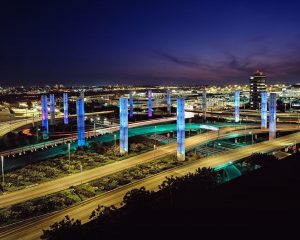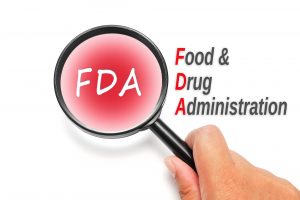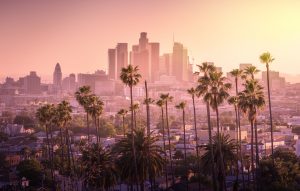|
Fear of Flying? No, I’m not talking about Erica Jong, although I am sure she would love Foria! Well, LAX is now a cannabis friendly airport. That does not mean on site consumption, but the LAX airport police, at best, would confiscate what they found as it’s legal in the State. However, the conflict comes in with TSA (Federal) workers who are not under the same rules as LAX police. The new LAX cannabis policy is quoted in full below: “While federal law prohibits the possession of marijuana (inclusive of federal airspace,) California’s passage of Proposition 64, effective January 1, 2018, allows for individuals 21 years of age or older to possess up to 28.5 grams of marijuana and 8 grams of concentrated marijuana for personal consumption.” “In accordance with Proposition 64, the Los Angeles Airport Police Department will allow passengers to travel through LAX with up to 28.5 grams of marijuana and 8 grams of concentrated marijuana. However, passengers should be aware that marijuana laws vary state by state and they are encouraged to check the laws of the states in which they plan to travel.” As an aside, let’s take special notice of OAKLAND International Airport which as of 2006 was the nation’s only airport with a specific policy letting users of medical marijuana travel with the drug. The policy is spelled out by the Alameda County Sheriff’s Office which states, in part, that if deputies determine someone is a qualified patient or primary caregiver as defined by California law and has eight ounces or less of the drug, he or she can keep it and board the plane. Deputies warn the pot-carrying passengers may be committing a felony upon arrival in a jurisdiction where medical marijuana is not recognized. What’s going on in Sacramento? Like Tom Waits would have said, mixed messages over mixed drinks. The bill authorizes local jurisdictions the power to determine what venues temporary cannabis events can happen in. Assemblyman Bill Quirk, D-Hayward, who sponsored the bill stated that “Cannabis events support local economies and small businesses. Despite the fiscal and communal benefits such events bring to a city or local community, current law prohibits local governments from approving applications for cannabis sales at special events if they are held anywhere but on county fairgrounds.” The goal is that AB 2020 will remedy the gap by allowing local governments to approve temporary cannabis event licenses at any venue they wish to permit. Gov. Brown did also sign bills that would expand hemp farming and on the social equity side, for the removal or reduction of prior cannabis convictions. However, on the flip side, there are those bills that went by the wayside. Here are a few which Gov Brown passed on and did not enact into law: The rejected bills would have provided for the following:
More on the ever-changing rules on CBD. The U.S. Drug Enforcement Administration has taken some CBD off Schedule 1, as we know, the most restrictive class of controlled substances. This will enable the sale of the first non-synthetic, cannabis-derived medicine to win federal approval. The DEA stated that “finished dosage formulations” of CBD with THC below 0.1% will be considered Schedule 5 drugs, as long as the medications have been approved by the U.S. Food and Drug Administration. It is the first time in 46 years that the agency has shifted its stance on a marijuana compound. While DEA could have placed Epidiolex in Schedule II, which would have ensured that the control requirements of the Single Convention were met, it instead placed the drug in Schedule V. Schedule V drugs are considered to have the lowest potential for abuse compared to other scheduled drugs and a low potential for psychological or physical dependence. Thus, these drugs are subject to less control under the CSA. The new definition to be an approved CBD drug, requires a three-part test: As such, it must:
This definition is obviously limited. Right now, the only CBD approved drug is Epidiolex. CBD product like oils, tinctures, lattes, and other foods are not approved CBD drugs. Why? They are not FDA approved. Speculation persisted among researchers that the agency was going to reschedule CBD entirely. However, the DEA rescheduled FDA-approved medications containing the compound. Nevertheless, the approval could generate new interest in the potential medical applications of CBD and other marijuana compounds. The DEA’s latest CBD-action, like Bob Dylan said is a sign of how the times-are-a-changin’. Again, it is the first time a cannabis derived product has fallen outside of Schedule I, so, baby steps are better than no steps or those that go backwards. Statewide crackdowns against those “undocumented” companies, continues. Here are some new stories from Sonoma and LA. In Sonoma County they have picked up enforcement of the undocumented. According to the county’s planning department, code enforcement staff members have forced more than 600 unpermitted cannabis operations to close and billed more than $435,797 in fines. The county said it quickly responds to cannabis-related complaints and forces operators to comply with county rules. Maggie Fleming, spokeswoman for Permit Sonoma, said the statement was issued in response to community feedback and a “lack of understanding that the county was taking action” against cannabis businesses operating without permits. The county has received 682 complaints about cannabis cultivation on private property since January 2017. Staff members have inspected 662 of those properties, forcing 638 to stop growing and allowing 24 to continue operating while seeking a permit. Another 20 inspections are scheduled “in the near future,” the county statement said. Tawnie Logan of Santa Rosa-based Canna Code Compliance said removing illegal operators is “absolutely essential” but the county has been “woefully underperforming” its processing of permits for cannabis growers. “Operators are going broke. They cannot continue to afford to play the waiting game that the county has put them in,” said Logan, former executive director of the Sonoma County Growers Alliance. “It’s offensive … to say that they’re investing so much money and time into illegal operators while they continue to be understaffed and underperforming for the businesses that want to be compliant and legal.” In Los Angeles, the City continues its fight against local unlicensed marijuana businesses. The LA’s City’s Attorney office reported that LA issued more than 500 misdemeanor charges against people. In 120 criminal cases filed since May, City Atty. Mike Feuer has charged 515 people in connection with 105 illegal marijuana businesses, grow sites, extraction labs and delivery companies located throughout the city. All were charged with unlicensed commercial cannabis activity, which could come with a sentence of six months in jail and $1,000 in fines. Though the number of defendants is significant, and may make a dent in unlicensed operations in the city, the larger goal and objective comes down to leveling the playing field for those businesses that follow the rules, Feuer said. As of September 2018, there were 165 approved cannabis storefronts and delivery businesses operating in Los Angeles. Local judges have been hearing the cases since May with arraignments scheduled through the end of October, Feuer’s office said. Though the number of defendants is staggering and will make a dent in unlicensed operations in the city, the larger aim of the crackdown is to try to level the playing field for the marijuana businesses that are following the rules, Feuer said. As of September 2018, there were 165 approved cannabis storefronts and delivery businesses operating in Los Angeles. We are off to the races and the pace of mergers and acquisitions is accelerating. On a personal note, we want to give a shout out to our good friends at DOPE Magazine, one of the industry’s best which was recently purchased by High Times. If you have attended any Cannabis conference the last four years, then you know the DOPE staff. That being said, talk about an iconic brand making a huge comeback, High Times (“HT”), the most-recognized brand in this space. HT announced the acquisition of DOPE Media, Inc. into their integrated cannabis consumer lifestyle company. The deal is valued at $11.2 million which was a split of cash and stock in the growing HT empire. The latest in a series of cannabis media consolidation, DOPE joins CULTURE, Green Rush Daily, as well as the flagship High Times Magazine, among the High Times media network. “DOPE is a very strategic acquisition for our portfolio offering key complementary assets to our existing platforms and opening the opportunity for economies of scale to improve performance of all our entire publication group,” said Adam Levin, CEO of High Times. DOPE Media, offers a unique solution to state-licensed cannabis brands and retailers looking to target their campaigns within their licensed territories, they also hold the largest Dope Cup events in Seattle and Portland adding to the existing Cannabis Cup portfolio for the High Times brand. Again, to our DOPE friends, Congrats and Mazol Tov. More on the M&A, Pepsi was not going to sit on the sidelines and watch Coca Cola jump into the beverage CBD market without some competition. We previously reported on Coca Cola entering into negotiations with Aurora Cannabis to develop CBD-infused beverages to ease inflammation, pain and cramping. Pepsi’s CFO Hugh Johnston told Jim Cramer and Sara Eisen on CNBC’s Squawk “I think we’ll look at it critically, but I’m not prepared to share any plans that we may have in the space right now.” We are seeing more very large corporations seriously looking into the cannabis industry. While it may be a double-edged sword for them, their participation adds momentum and credibility to the legalization movement and present expanded opportunities for cannabis investors and entrepreneurs. Tailored Benefits is an employee benefits company that has had cannabis clients for over eleven years. Jeffrey Rosen, Tailored Benefit’s founder, practiced law for ten (10) years in San Francisco, Silicon Valley & Taipei, Taiwan. He has run an employee benefits company for over twenty years. Tailored Benefits’ has evolved over the past several decades to play an integral part in the cannabis industry and specifically Employee Benefits. With the surge in demand for cannabis employees, Tailored Benefits’ specific cannabis employee benefit solutions is how you can set yourself apart, attract and retain valuable employees. If you need more information on how to insure your cannabis business, Tailored Benefits is here to guide you and keep you informed on local and federal policies. All the best, Jeffrey Rosen, President (415) 974-1114 |

























